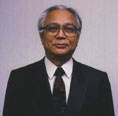Our Message to the World After the War in Iraq
Shumpei KUMON (Professor and Executive Director, GLOCOM)
 In my "urgent message from GLOCOM" in the aftermath of the September 11 attacks, (http://www.glocom.org/opinions/essays/200109_kumon_urgent/), and also in my follow-up statement one year after that tragic incident (http://www.glocom.org/opinions/essays/200209_kumon_one_year/), I called for united efforts to exchange ideas through our network of friends and professionals in order to find ways to fight terrorism and to solve underlying problems such as poverty and tyranny, which tend to create terror in the world. Although we have been trying our best in this regard, it is regrettable to see that the war against Iraq broke out. We blame ourselves for the ineffectiveness of our efforts to find ways to solve such underlying problems without resort to military power. In my "urgent message from GLOCOM" in the aftermath of the September 11 attacks, (http://www.glocom.org/opinions/essays/200109_kumon_urgent/), and also in my follow-up statement one year after that tragic incident (http://www.glocom.org/opinions/essays/200209_kumon_one_year/), I called for united efforts to exchange ideas through our network of friends and professionals in order to find ways to fight terrorism and to solve underlying problems such as poverty and tyranny, which tend to create terror in the world. Although we have been trying our best in this regard, it is regrettable to see that the war against Iraq broke out. We blame ourselves for the ineffectiveness of our efforts to find ways to solve such underlying problems without resort to military power.
However swiftly the war ends, it is likely to leave serious divisions among many people. It has already created a rift among major Western nations, and a discrepancy between the government and the general public in many nations, not to mention a conflict between the United States and Britain on one hand and the Arab world on the other. This means that we have to renew our commitment to our intellectual efforts to iron out differences of opinions and positions among various parties by more actively engaging in dialogue and information exchange to discuss what each of us can contribute to the elimination of terror and its underlying problems.
Specifically, I would like to propose a global project to hold online conferences to discuss post-war reconstruction of Iraq and the Middle East from purely professional and humanitarian viewpoints and not in the interest of political or economic power over the region. By actively organizing such activities we can utilize our wisdom to help build a new world order not for the sake of any particular nation, but for the sake of ourselves as human beings free of terror, poverty, injustice and tyranny.
As I have often said, we are now living in a society where we can effectively exercise our intellectual influence and compete in what might be called the "wisdom game." This kind of society, namely the "information society," may be considered the final phase of modernization in a broad sense. However, the present situation also corresponds to an overlapping phase of declining national military power, maturing economic power, and emerging intellectual power. In this phase we should try our best to prevail with our intellectual power to contribute to the formation of the information society, where human values are respected and restored in local communities with global properties, namely, "global villages." It is our hope that such a society will emerge and there will never be another war like this one.
|





